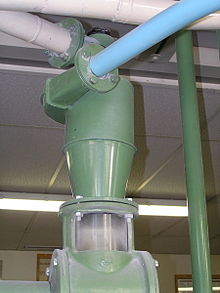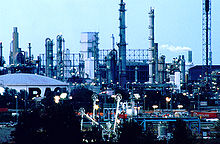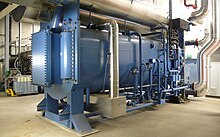process technology
The process technology is a self- engineering science that deals with all processes in which substances (gases, liquids or solids) are changed with respect to composition, nature or properties. It uses physical , chemical or biological processes. Within production engineering, process engineering deals with the manufacture of substances ( raw material ) and the conversion of substances with an undefined shape, while manufacturing technology processes these starting products into bodies with a geometrically defined shape.
Examples are the grinding or sieving of grain, the extraction of metals from ores , the production of paper or the separation of the individual components of crude oil . The raw material of a manufacturing process can itself be the product of a previous processing, and the product can be further processed. This networking is known as a production network. The recovery, the recycling of valuable materials from waste , also falls within the scope of process engineering. The increasing generation of energy based on renewable raw materials ( bioenergy ) requires the use of process engineering methods.
Process engineering is a strongly interdisciplinary science. Related fields include metallurgy , chemical engineering and chemistry , apparatus engineering (part of mechanical engineering ), biotechnology, and environmental engineering .
Engineering science and job description
As defined by the Society of Chemical Engineering and Chemical Engineering (GVC), the working process engineering all processes with the technical and economic implementation in which substances on the type, properties and composition are changed. So it is the engineering science of matter conversion. In practice, the process engineer often works closely with the natural sciences, e.g. B. works with chemists as developers and converts their knowledge into realizable technical concepts and processes. Increasing the production scale and the energy budget of a process are often decisive questions.
However, the implementation of the process engineering developed and planned plant, itself referred to as plant construction , is covered by the process engineering. The main task of the process engineer is to select and design the equipment, components and materials to be used for construction. In addition, there is also the measurement and control engineering planning of the process to be operated to an ever increasing extent . Here, the knowledge gained from theoretical and experimental process engineering work is often incorporated into computer-aided simulations . These then serve as a starting point or even as a management model for process control. Due to the very interdisciplinary nature of the course, graduates find a very wide range of practical applications. From work as a researcher in the laboratory, as developer and programmer of simulations or control systems, to work as calculation and project engineer, to construction manager or operator of production plants, process and chemical engineers are in the entire chemical, energy, food and the pharmaceutical industry, as well as in the corresponding plant construction companies and research institutions.
education
Process engineering courses are offered in Germany at technical universities and other universities . The respective degree programs differ in detail between the universities. Depending on the tradition or the thematic orientation of the respective institution, the training can be more oriented towards technology or chemistry (see chemical engineering ). While at some universities process engineering branches off directly from the mechanical engineering course as a major, at other institutions the subject is an independent basic or bachelor's degree for a later focus such as bioprocess engineering or the main or master's degree in chemical engineering. For this purpose, there are also separate process engineering subjects or specializations in independent scientific areas. This is, for example, agricultural technology or the technology of livestock husbandry within agricultural science . Specializations in the field of process engineering (energy plant construction, renewable energies ) are also increasingly being offered. Mechanical engineering and electrical engineering are often incorporated into the subject. Following technical developments, this sometimes leads to the establishment of new subjects, such as environmental engineering , biotechnology or food technology .
In addition, the German and English language usage is different for the terms of process and chemical engineering. As Process Engineering in English, although the procedural activity is called an engineer. The subject of study that corresponds to the German definition of process engineering in English-speaking countries is mostly chemical engineering (also, for example, in Spanish: Ingenieria química ). In Germany, on the other hand, a clear distinction is made between process engineering and chemical engineering in higher education.
The degree in process engineering courses in the Federal Republic of Germany was usually the academic degree of a graduate engineer . As part of the Bologna process , the conversion or introduction of the new academic degrees, Bachelor and Master, took place here as well .
Work equipment and structure of process engineering
Process engineering has developed from its beginnings in pipeline and boiler construction to an interdisciplinary science. Today, for the design of the processes besides
- the natural and material sciences for describing the process and its material effects, too
- the economic, social, political and legal sciences for the acceptance, the framework and the operation of the process
needed. Furthermore, all other engineering sciences are used to implement the process in plant construction.
Process engineering systems produce between a few grams and several million tons per year. Simple chemical substances through to complex components are produced. In order to describe the plethora of processes, they will no longer physically meaningful separable unit operations ( English unit operations ), cut with just a physical process, such as mixing or evaporation. Process steps that are a spatially inseparable combination of several basic operations are usually also referred to as basic operations. Classes of basic procedural operations are, for example:
- Change of material properties: shredding , cooling , drying , ...
- Change of material composition: filtration , distillation , ...
- Change of substance type: oxidation , hydrogenation , polymerisation , ...
These basic operations are strung together and result in the overall process. A process designed in this way is predictable and feasible, but not energy and space-optimized. The cost pressure in the industry and the better simulation and analysis options as well as the better physical understanding mean that today more and more basic operations are combined in one process step. However, in order to understand the overall context, it makes sense to consider the process in separate physical basic steps.
Process engineering is therefore still divided along the physical processes of the basic operations into:
- Mechanical Process Engineering,
- Chemical process engineering,
- thermal process engineering and
- the other processes, which are usually added as physical processes to chemical process engineering.
In addition, there is the incalculable number of complex, inseparable processes such as:
- biological process engineering,
- Interfacial engineering and
- Membrane process engineering .
Likewise the required auxiliary, implementation and special disciplines, such as:
- Measurement and control technology ,
- Plant construction and
- nuclear process engineering.
Another, older structure is based on the substance groups: food process engineering, plastic process engineering, etc.
In pharmacy , process engineering is called galenics ; referred to as a recipe in the pharmacy (old: drug form theory). In industry it is referred to as processing technology or pharmaceutical technology.
Differentiation from other sciences
Basically, every process development that involves a material flow involves process engineering. It is therefore a mostly not mentioned part of every science. Process engineering emphasizes the process itself and tries to optimize it with the given boundary conditions. In other disciplines, a given process is usually assumed because the focus is on other aspects.
Process engineering deals with the same subject as the other natural sciences and uses its tools. In contrast to other natural sciences, process engineering does not try to reveal a new connection, but rather to make a recognized connection technically usable. Questions that arise when designing new processes usually lead to close cooperation with other natural sciences.
Process engineers use the tools of engineering. They determine the space and the conditions under which a process takes place.
Chemical engineering is a process engineering discipline that focuses on chemistry . In contrast, environmental technology focuses on legal, toxicological and logistical aspects of supply and disposal.
Sub-disciplines
Mechanical Process Engineering

The mechanical process technology is to be understood as a user of the mechanism or the fluid mechanics . She therefore deals with processes of material transformation that are based on mechanical action. The four main process groups are comminution and agglomeration as well as mixing and separation (filters, sieves).
Historically, its roots lie in pipeline construction and solid process engineering. Traditionally, storage , conveying and dosing of solids , bulk goods and liquid goods (e.g. conveying by pumps ) are therefore usually added to mechanical process engineering.
Thermal Process Engineering
Thermal process engineering is particularly concerned with thermal separation and purification processes such as distillation as well as with the processes of rectification and extraction . Processes that run using membrane technology are also part of thermal process technology.
Chemical process engineering

The Chemical Engineering ( Chemical Reaction Engineering ) deals with material changes by chemical reactions and forms the strongest link in the process technology for chemistry. In particular, the transition from the laboratory scale of chemistry to the industrial scale is examined. This includes, for example, the construction of pilot plants and the investigation of kinetics. The chemical engineer thus does significant work in the implementation of laboratory results in the production process. This transfer of scale is usually referred to today as " scale-up ".
Electrochemical process engineering
Electrochemical process engineering deals with the technical applications of electrochemical phenomena (e.g. synthesis of chemicals, electrolytic refining of metals , batteries and fuel cells , sensors , surface modification through galvanic deposition and etching, separations, and corrosion ).
Bioprocess engineering
The bioprocess engineering (also bioprocess engineering or bioengineering ) is the area of biotechnology that deals with process engineering implementation, or the part of process engineering that deals with biotechnological processes. Biotechnology makes material conversions through biological processes usable in technical applications. These processes can be carried out by the enzymes (previously: ferment) contained in cells (mostly bacteria , yeasts , fungi ) or by isolated enzymes. In both cases one speaks of biocatalysis , biosynthesis or fermentation . In contrast, one speaks of cultivation only when cells are used that multiply or metabolize during the process. Sub-areas of biotechnology are z. B. microbiology , chemistry and biochemistry . Genetic engineering methods can be used, but they are not necessarily used in all biotechnological applications. An important area of biotechnology is process engineering, which implements processes on a research or production scale. This includes the general planning and implementation of a process, the development of process control and the preparation methods for the products, the control of production processes and their ongoing optimization.
Advantages and disadvantages
Biotechnological processes can have various advantages and disadvantages compared to chemical processes:
- Chemical processes sometimes require extreme conditions (e.g. high pressures and / or temperatures) and toxic chemicals. Biological processes take place under less extreme conditions and can replace various chemical processes because of economic and ecological advantages.
- Some compounds cannot be synthesized by chemical methods, but can be produced biotechnologically.
- In pharmaceutical applications in particular, it may be necessary to use only one variant of chiral compounds. In the case of biotechnological production there is only one variant, whereas in chemical production there is usually both.
- Since biological processes cannot take place at arbitrarily high temperatures, the reaction speed is also limited. Reactors therefore often need larger volumes here than in non-biological processes.
Areas of application
Biotechnological applications vary widely and are therefore divided into different areas. In addition to bioprocess engineering for the production of certain compounds, these individual areas can also include other fields:
- The white biotechnology (industrial biotechnology) can chemical processes in which non-enzymatic catalysts are used to replace and complement. There are z. B. fine and basic chemicals , enzymes and other produced.
- The Red Biotechnology ( Medical Biotechnology) has several tasks, including the bioprocess production of drugs , diagnostics and vaccines .
- The Green biotechnology is mainly concerned with the optimization of crops. Bioprocess engineering plays a subordinate role here
- The gray biotechnology (environmental biotechnology) uses enzymes and microorganisms for the treatment of drinking water, sewage, exhaust air, waste, exhaust gases and others.
- The blue biotechnology (marine biotechnology) uses marine microorganisms.
- Yellow biotechnology (mostly defined as food biotechnology) is used in the food industry, e.g. B. for the production of beer using yeast , yoghurt and sauerkraut using lactic acid bacteria etc.
While the terms white, red and green biotechnology are established, the other color assignments are so far less common.
Procedure types

The numerous possible applications have resulted in various processes that can vary widely. Bioreactors (fermenters) are often used. The fermenters usually contain agitators for homogenization, devices for temperature setting and other technology for monitoring and controlling important parameters.
- Sterilizable fermenters in which the parameters (temperature, oxygen content, pH value, etc.) can be precisely controlled are used primarily in white and red biotechnology .
- Various bioreactors are used in gray biotechnology, such as B. Digestion towers in sewage treatment plants , fermenters in biogas production and biofilters in exhaust air purification.
- In food technology (yellow biotechnology) z. B. used in beer production fermentation tanks as bioreactors.
- Other bioreactors are z. B. algae reactors , photobioreactors , hydrogen bioreactors etc.
The products are made according to different principles:
- Enzymes can ensure that a substance is converted.
- Often microorganisms are cultivated whose metabolic products represent the product (e.g. ethanol , butanol , citrate ).
- Storage substances of the cultivated kind, such as B. the microbial carbohydrate storage polyhydroxybutyric acid can be the product.
- Genetic modification can induce overexpression in the species to be cultivated or a new metabolic pathway can be transferred into the species so that the desired product is produced with a high yield.
Subsequent to production ( fermentation ), downstream processing is usually necessary. Depending on the process, this can be very complex and include steps such as cell disruption , filtration , chromatography and others. This area is also assigned to bioprocess engineering.
System process engineering
System process engineering as part of engineering systems theory has the task of modeling the dynamic behavior of process engineering systems, optimizing the system structure and designing the subsystems required to control the material-converting processes.
Nanotechnology

The nanotechnology or nanotechnology is still a young field which very interdisciplinary areas of the physics , the chemistry , the biology united and process engineering. It deals with substances and systems which, due to their size, may only consist of a few molecules . Nanoparticle technology is of particular importance for process engineering. Due to the small geometrical dimensions of nanoparticles, they have special optical and electronic properties, which require special measuring methods, but can also lead to new applications. An example of these particles are carbon nanotubes , which behave very differently than z. B. graphite particles.
See also
literature
- Peter Grassmann: Physical basics of chemical engineering technology . Sauerlander, Frankfurt am Main 1961.
- Eckhart Blaß: VDI-Gesellschaft process engineering and chemical engineering GVC - yesterday-today-tomorrow . Saur, Düsseldorf 1984.
- Horst Chmiel (Ed.): Bioprozesstechnik . 2nd Edition. Spektrum, Munich 2006, ISBN 3-8274-1607-8 .
- Hans Günther Hirschberg: Handbook of process engineering and plant construction. Chemistry, technology, economy . Springer, Berlin and Heidelberg 1999, ISBN 3-540-60623-8 .
- Georg Maybaum, Petra Mieth, Wolfgang Oltmanns, Rainer Vahland: Process engineering and construction operations in foundation engineering and special civil engineering . Vieweg and Teubner, 2nd edition 2011, 454 p .; ISBN 978-3-8348-1614-6 .
Web links
- GVC, VDI Society for Process Engineering and Chemical Engineering
- DECHEMA, Society for Chemical Technology and Biotechnology e. V.
- GVT, Research Society Process Technology e. V.
- AIChE, American Institute of Chemical Engineers
Individual evidence
- ↑ Kögl, Moser: Fundamentals of Process Engineering , Springer, 1981, p. 1.
- ↑ Electrochemistry Encyclopedia ( Memento of the original from May 14, 2011 in the Internet Archive ) Info: The archive link has been inserted automatically and has not yet been checked. Please check the original and archive link according to the instructions and then remove this notice. .
- ↑ "The rainbow colors of biotechnology" ( Memento of the original from June 8, 2009 in the Internet Archive ) Info: The archive link has been inserted automatically and has not yet been checked. Please check the original and archive link according to the instructions and then remove this notice. Article on the information site "chemie.de", (accessed on December 3, 2009).
- ↑ a b Applied Microbiology, Garabed Antranikian, Springer-Verlag Berlin Heidelberg, 2006.

